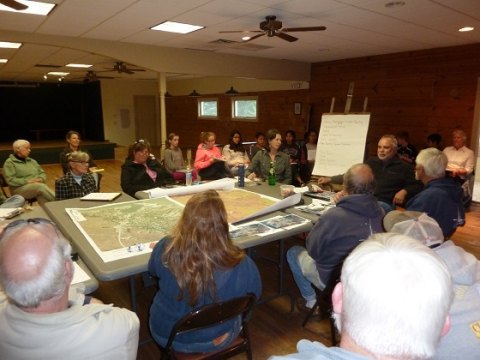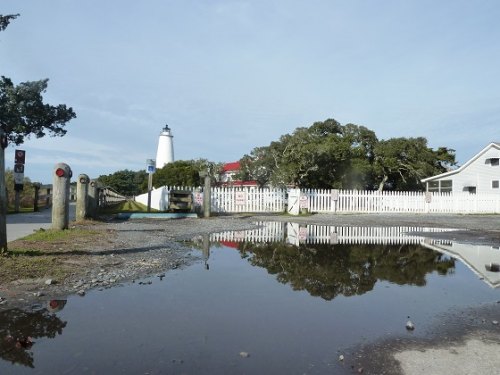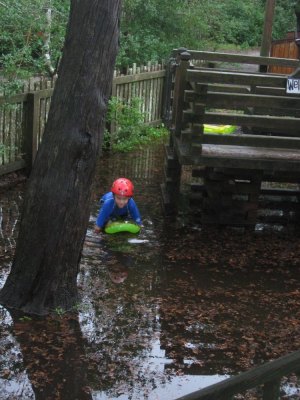Water, Water Everywhere
It seems to be up to the residents to take action.
The North Carolina Coastal Federation hosted a public meeting on Thursday, November 21 to explore options to manage storm water and improve water quality in the village. About 50 residents attended, including the seventh and eighth grade classes from Ocracoke School.
Where do big puddles form on Ocracoke? Hands went up, and there wasn't time to call on everyone.
"Some of these areas have been flooded since the 1940s and 1950s," said Betty Helen Chamberlin, a former student of Ocracoke School, who now owns Captain's Landing and Captain's Cargo.
When Bill Jones retired to Ocracoke, he thought standing water was only a problem after hard rains. Then he lived here for a while and realized large puddles formed "after any rain at all." Bill would also like the brakes on his car to stop rusting out.
"What has gotten in the way of the natural solutions?" asked civil engineer Andy Deel. Where does gravity want the water to go?
Marsh and sand are natural filtration systems, and all water flows to the sea. New construction often involves fill to meet insurance and FEMA requirements, creating barriers that trap water in the streets and yards.
Solutions are possible, said lifelong resident and former Hyde commissioner Gene Ballance. Remember when the road between the lifeguard beach and campground would be underwater for days after a rain? You had to drive that entire stretch at 8 mph and now it's the most reliable section of Highway 12 between here and Nags Head, said Ballance.
Standing water can be a hazard to public health, and water quality in the harbor is poor.
The challenge is to "address stormwater management in a way that doesn't undermine water quality in Silver Lake," said Ocracoke Coffee Co. owner Justin LeBlanc. He is concerned that perpetual puddles detract from the island's appeal as a vacation destination.
"Existing drainage systems do bring some contaminants," said Mike Johnson. He would like to "make the existing system function." Flapper gates and drains installed by the NC DOT about ten years ago are now clogged and silted shut. Retrofitting the existing systems does not require permitting.

People don't like walking, biking or driving through sketchy brown water, and that can discourage "trafficability," said LeBlanc, who is one of the more sensible and concise people currently attending public meetings on Ocracoke. He has lived in places in America where the drainage systems work, and seemed confident solutions are possible on this island.
Welcome to your new committee, Justin!
Toward the end of the two and a half hour meeting it was decided to ask Hyde Commissioners to appoint a committee to propose drainage solutions for the village of Ocracoke, with the intention of implementing a test case to demonstrate the viability of removing rainwater.
The pond near Blackbeard's Lodge would be a visible, viable place to start, said engineer Joe Anlauf. "You need a management entity and money," said Anlauf.
Ah, yes. Money.
The Sanitary District is not responsible, employee Dave Frum emphasized several times during the meeting. The Sanitary District is run by an elected board that charges fees for a reliable source of fresh water. It formed in the 1970s to offer an alternative to cistern and well water. They bring fresh water. They do not drain it.
The NC DOT installed culverts and drains on state roads where it has right of ways. Right of ways are nonexistent around the harbor, where private property extends to the center yellow line. Drains installed 30 years ago by NCDOT, like the ones on British Cemetery Road adjacent to the Anchorage Inn, are clogged and function poorly.
"Some projects will take a lot of landowner buy-in," said NCCF board member and former State Extension agent Mac Gibbs. "DOT faces the same problem as everyone else--where to put the water."
The mosquito control board is not responsible for drainage, although it does concern them, because standing water creates breeding grounds for mosquitoes. Their task is to control the mosquito population. They keep the water flowing where they can, but have neither the budget nor authority to create a drainage infrastructure.
Where will the money come from?
Mainland Hyde has a series of independent drainage districts that levy a tax and are managed by citizen supervisors, said Gibbs. The county handles the money; the districts create their own solutions from that budget.
"On the mainland, if it wasn't for drainage, we wouldn't have anything," observed Gibbs. Even the Dutch who settled in Eastern NC went further inland than Hyde.
One option the committee could examine is creating a drainage district on Ocracoke, said both Deel and Anlauf. There is often "mixed support about another entity that will tax you," said Deel.
"I don't want it to be a taxing authority," said Amy Johnson, who thinks poor water quality in the harbor is due to point sources, like live aboard boats, faulty septic systems, and a thriving non-migratory duck population.
Hyde County has few financial resources to devote. If a drainage project is proposed, the county will work with the Coastal Federation to pursue grant money, said Averi Simmons of the Planning Department. Granting agencies will want to know that there is a system and funding in place to maintain their investment.
The drainage systems that do exist channel stormwater either to Pamlico Sound or Silver Lake.
"Stormwater is dirty stuff," said Deel. Water treatment is all about space, unless a "super expensive" system is put in place. "Silver Lake doesn't have the flushing. Wetlands have more natural treatment. The best management practices attempt to emulate wetlands. End of pipe solutions do not exist."
"No one's donating land for drainage," observed Ocracoke resident Tom Payne.
If the state determines that water qualtiy on Ocracoke is a public health hazard, NC could place a moratorium on all new construction on Ocracoke until the problem is fixed. If septic systems are under-performing or in need of repair, it is the county's responsibility to regulate that, said Anlauf.
Over the years, some drainage ditches passing through private property have been filled in. Drainage ditches become de facto right of ways on private land.
A scheduled re-paving of Ocracoke roads over the winter may help with some areas. Frum is optimistic that could improve the area around the lighthouse, where rainwater languishes until it evaporates.
There will never be solutions for major storms and extreme high tides, agreed everyone. But there may be a time when school children are no longer carried from their parents' cars to the school steps, and optimists might even envision a future where kids once again leap from docks to swim in the harbor after school.





